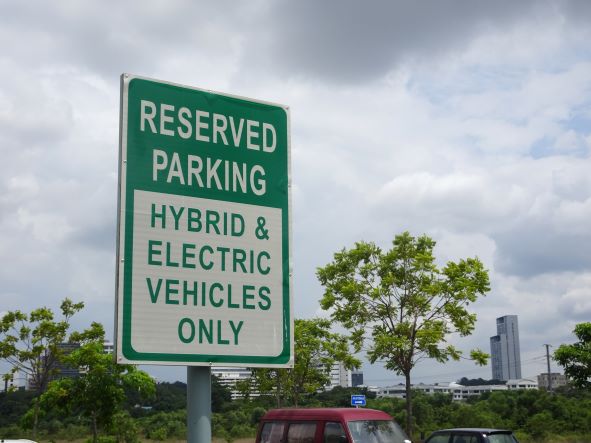Everybody has an eye on sustainability today. Crucial changes are being made where the auto industry is concerned too. After all, the sale of new p
Everybody has an eye on sustainability today. Crucial changes are being made where the auto industry is concerned too.
After all, the sale of new petrol and diesel is banned from 2030, a full decade earlier than originally planned. It can seem like a far off target to meet, but that deadline is fast approaching in the grand scheme of things.
Moreover, sustainability and eco-friendly lifestyles are constantly being promoted in the media and within communities. Everybody is more conscious of their responsibilities in the UK, and excuses for complacency on green issues have essentially run out.
If you’re a road user, it’s within yours and others’ interest to be more eco-friendly during your travels. We’ve listed the main ways you can succeed in this down below.
Secure an Electric Vehicle
The 2030 ban on petrol and diesel vehicle sales is mainly for manufacturers and dealerships to keep in mind. When making your own decisions, you can work well ahead of this deadline.
It’s the perfect time to secure an electric vehicle. While purchases can be expensive, much money can be saved in the long run through lower maintenance and running costs. It’s an investment in the future that you should consider making.
That said, not everybody can afford an electric vehicle at present. Fortunately, other promising options are available. For example, you could explore an electric car lease deal, looking after it for a limited period. Costs can be kept down under these flexible measures, enabling you to get acquainted with an electric vehicle.
You can find more information on car leasing deals using the guides on lvelectrix.co.uk. If you need additional assurances, you can also take their quiz to see if the vehicles are right for you and can be accommodated by your lifestyle. All the essential costs and charging logistics are covered, enabling you to make an informed and confident decision about your motoring future. Any potential concerns of yours can be eased here.

Offer Carpooling Services
You’re not responsible for the actions of others. That said, you can be a more eco-friendly driver by influencing others in the right way.
For instance, you could take it upon yourself to drive people to and from their destinations. Doing this may enable you to keep their gas-guzzling vehicles off the road, even for a limited time. Drivers are increasingly being pushed to share their car rides, so it’s a measure that has tangible results and is well worth considering.
If expenses concern you, try not to worry. If you’re driving friends and family members around, they should offer to pay any recharging or refuelling costs. Should they fail to do so, it’s not rude to acknowledge the expense yourself and make a polite request. Any reasonable individual would be happy to comply, especially if it’s only a fraction of the usual costs.
It could be best to have structure to your efforts here too. For example, instead of spending all your free time offering lifts to people at inconvenient times, you could instead limit your carpooling to a scheme your workplace has set up already. That way, you benefit from a routine without finding things overwhelming.
Use Eco-Friendly Car Washing Services
Washing your car can seem like a mundane task. Many road users put themselves on autopilot during this time, whether they’re using a professional service or washing their vehicle themselves.
Some car washing services will advertise their measures in sustainability. Their procedures might include:
- Conserving water – Some car washers try to implement waterless washing procedures, favouring the use of substitute products instead. If they use wash water, they’ll typically recycle it. They’ll also research where it comes from originally to meet sustainability targets.
- Using biodegradable products – The cleaning solutions used can be derived from vegetable and coconut oils. Other organic products and soaps may be in use on-site.
- Mitigating electricity and gas use – Eco-friendly car wash services may use the latest high-efficiency machines to save on power without compromising the quality of the wash.
Businesses partaking in these efforts will often be accredited, so keep on the lookout for any signs and symbols of their progress. Such services may be fewer in number than one might hope but keep on the lookout. Remember that these efforts are ongoing and likely to rise in popularity through the years.
Plan Your Journey
If you’re not driving an electric car, then every second you spend driving can makes a difference. One of the most sensible things you can do in these situations is to plan your journey.
It’s not uncommon to get lost while driving, and drivers can spend hours on the road without needing to in unfortunate circumstances. Why risk using more fuel than necessary? You can ensure that you drive with fuel conservation in mind and minimize your impact on the environment by planning your journey.
Remember, the most direct route isn’t always the most efficient. Times of day, such as rush hour, can influence how long you spend sitting in traffic. Research any road accidents that may have transpired and keep your radio on. Turning your engine off during delays can help, but you’ll be undermining your efforts to be an eco-friendly road user if you stop and start frequently.
Pick other people’s brains. After all, they may know shortcuts or better roads to take. Ask for the insights of anyone accompanying you, too, should you need to adapt to any unforeseen circumstances.
Driver Lighter
If you’re still driving a petrol or diesel vehicle, you should know that the heavier they are, the more fuel they will use. As part of planning your journey, you should reconsider what belongings need to be in your car.
Dispense with everything non-essential. Remember, even smaller items can contribute to things, especially if there are many. Play things safe and get rid of everything you don’t need.
Only take things like first aid kits, ice scrapers, pet supplies (when they’re accompanying you), and spare parts. Think pragmatically without luxuries and keepsakes crowding your mind. You may even enjoy driving more once your car is clean and free of clutter.
Carpooling will add more weight to your vehicle. Still, these concerns are seldom worth thinking about, as the additional loss of fuel will be offset against your passenger’s vehicles being temporarily out of use. Consequently, you shouldn’t second guess your measures in this regard.
Turn Off Your Air Conditioning
If you’re using an electric vehicle, you can use your air conditioning. However, it can burn through fuel much faster when switched on in petrol and diesel vehicles. Therefore, it’s likely in your interests to have it off where possible if you’re driving that type of automobile.
There will be some incidents where having your air conditioning switched on is essential. For example, if you’re travelling with a dog on a hot summer’s day, ensuring they stay cool is imperative. However, if you’re without a dog or at least undertaking trips without one on occasion, you should consider turning it off.
Opening windows can be a viable solution. Alternatively, you could pull over on your journey and spend a few moments in the fresh air. Park at intermittent periods in the shade, enjoy a cool drink (stored in a cooling bag) and settle into a cooling seat cover. Some of these solutions may add a few minutes to your journey, but they can make a big difference when being a more eco-friendly road user.



















































































































COMMENTS